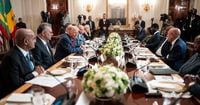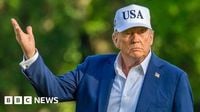On Wednesday, July 9, 2025, President Donald Trump hosted the leaders of five West African nations—Gabon, Guinea-Bissau, Liberia, Mauritania, and Senegal—at the White House in a meeting that marked a significant shift in U.S.-Africa relations. The summit, which included a multilateral lunch followed by closed-door economic discussions, underscored the Trump administration’s pivot from traditional aid towards a trade-focused partnership with Africa.
In a clear departure from past U.S. foreign aid policies, Trump emphasized the continent’s "great economic potential," declaring, "We’re shifting from A.I.D. to trade." This statement came alongside the recent dissolution of the United States Agency for International Development (USAID), signaling an end to what the administration termed a "charity-based foreign aid model." Instead, the U.S. aims to foster partnerships with countries demonstrating "both the ability and willingness to help themselves."
The five West African nations, while representing a small fraction of U.S.-Africa trade, boast significant untapped natural resources. Mauritanian President Mohamed Ould Ghazouani highlighted his country’s wealth in rare earth elements, manganese, uranium, and possibly lithium, inviting investment opportunities. Gabon’s President Brice Clotaire Oligui Nguema echoed this sentiment, noting, "Our country is free, open to one and all. You are welcome to come and invest. Otherwise, other countries might come instead of you." Gabon, in particular, holds about a quarter of the world’s known manganese reserves and supplies 22% of China’s manganese—a mineral crucial for battery and stainless steel production.
Trump’s outreach to these leaders comes amid growing geopolitical competition in Africa, especially from China and Russia. Beijing remains Africa’s top trade and investment partner and is reportedly scouting port locations along West Africa’s coast for potential military use. Meanwhile, the U.S. military has scaled back its presence in the Sahel region after nearly two decades of counterterrorism operations. Analysts view the summit as an attempt by the U.S. to accelerate trade and investment and reassert its strategic presence where its influence has waned.
During the White House lunch, the African leaders lavished Trump with praise, with many supporting his nomination for a Nobel Peace Prize. Mauritania’s Ghazouani thanked Trump for facilitating a peace deal between Rwanda and the Democratic Republic of Congo (DRC) in June 2025, which the U.S. administration helped broker. This agreement is seen as a strategic move to gain access to critical minerals in the region, although violence continues in eastern Congo despite the deal.
Senegal’s President Bassirou Diomaye Faye took a lighter tone, complimenting Trump’s golf skills and inviting him to build a golf course in Senegal. He also spoke of ambitions to develop a "tech city" in Dakar with "views of the sea," extending an invitation to American investors. Guinea-Bissau’s President Umaro Sissoco Embaló expressed pride at the invitation, noting his country’s progress from being labeled a "narco-state" to a "well-structured state," and expressed hopes for the reopening of the U.S. embassy in Bissau.
However, the meeting also reflected the complexities and contradictions of the Trump administration’s Africa policy. While Trump spoke optimistically about economic opportunities, the U.S. has imposed sweeping aid cuts that have hit countries like Liberia hard. Before the cuts, U.S. aid amounted to 2.6% of Liberia’s gross national income—the highest percentage globally. Liberia’s fragile health system, which relied on U.S. funding for 48% of its budget, has been severely affected. Liberian President Joseph Nyuma Boakai expressed optimism about the summit’s outcomes and reaffirmed Liberia’s commitment to regional stability, democratic governance, and inclusive economic growth.
The president’s remarks during the lunch also sparked controversy and social media backlash. Trump complimented Boakai’s English, saying, "Such good English. Beautiful English. Where did you learn to speak so beautifully?" This comment drew criticism because English is Liberia’s official language, a legacy of its founding in 1822 by freed African Americans under the American Colonization Society. Liberia became Africa’s first republic governed by people of African American origin in 1847. Critics called Trump’s comment a "national embarrassment," highlighting his apparent ignorance of Liberia’s history and culture.
Beyond trade and aid, Trump also emphasized immigration control during the meeting. He asked the African leaders to assist in cracking down on visa overstays by African immigrants in the U.S. and discussed "safe third-country agreements," which involve countries accepting deported migrants who are not their citizens. Mauritania and Gabon have been targeted by U.S. diplomats for such deportation deals. Additionally, the administration is considering expanding its travel ban to include four of the five countries represented, with Guinea-Bissau currently exempt.
Migration remains a critical issue, particularly for Mauritania and Senegal, which serve as departure points for illegal emigration. Between 2023 and 2025, over 20,000 young Mauritanians and hundreds of Senegalese reportedly traveled to the U.S. via Nicaragua. Addressing these concerns aligns with Trump’s broader immigration policies, which have been a hallmark of his administration.
Security and stability were also on the agenda. The Gulf of Guinea, where Gabon is strategically located with an 800-kilometer coastline, has become a hotspot for maritime terrorism and piracy, threatening vital oil and gas tanker routes. The U.S. has expressed concern over these threats and China’s increasing military presence in the region. Gabon’s strategic location could also make it a candidate for a future U.S. military base.
Despite the positive tone of the summit, experts caution that the new U.S.-Africa relationship is transactional. African countries are leveraging their natural resources and infrastructure to attract U.S. financial and security investments, while the U.S. is keen to counter the influence of rival powers. The peace deal between Rwanda and the DRC, facilitated by the U.S., serves as a model for this approach, linking diplomacy with commercial interests.
As the meeting concluded, Trump expressed interest in visiting Africa during his second term, saying, "We’re going to see what the schedule is, but I would like to do that very much." The summit thus represents both an opportunity and a challenge: to redefine U.S.-Africa relations in a way that balances economic interests, security concerns, and the continent’s development needs amid shifting global dynamics.





